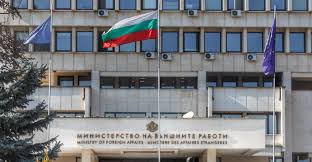Bulgaria’s foreign ministry criticises presence of German ambassador at justice for all protest

Sofia: Bulgaria’s Foreign Ministry issued a statement on July 17 that in effect – without naming her – criticised German ambassador in Sofia Irene Plank for being present at the Justice for All protest in the capital city the night before.
As The Sofia Globe reported, the July 16 protest by the Justice for All civic initiative was the latest in a continuing series campaigning for genuine judicial reform, but attendance was bolstered by public indignation at the appearance of the use of state institutions to repress political opponents.
Plank, who was present at the event but neither participated nor made public statements, was seen in one photograph standing in the dense crowd near We Continue the Change leader Assen Vassilev.
The Foreign Ministry, saying that it was responding to “inquiries regarding the presence of a foreign diplomat” at the protest, said that it “attaches extremely high value to the active and fruitful dialogue with the diplomatic corps accredited in the country, as well as to the good spirit of co-operation with the foreign missions carrying out their mandate on the territory of the Republic of Bulgaria”.
The ministry said that it emphasises “the importance of adhering to the principles of respect and impartiality towards the internal political processes of the host country, as a basis for maintaining good will and mutual trust between institutions”.
“In this context, the ministry would like to appeal to the representatives of diplomatic missions in the country and their heads to exercise particular attention and professional sensitivity with regard to their public appearances, in order to avoid opportunities for their instrumentalization for domestic political purposes.
“Any direct or indirect involvement in political processes at the national level risks placing diplomatic representatives in a position incompatible with the nature of their mandate and the functions of the diplomatic service as a whole,” the statement said.
The ministry said that it remains deeply committed and dedicated as a priority to maintaining an open and constructive dialogue with all its partners and expresses confidence that good diplomatic practices will continue to be a guiding principle in relations between the Republic of Bulgaria and foreign missions represented in the country.
The German embassy, in a post on its Facebook post on July 17, said that the German ambassador follows all important domestic political processes: “Somtimes this includes gathering personal impressions of various protests”.
“This is the reason for ambassador Irene Plank’s visit yesterday to the protest organised by Justic for All,” the embassy said.
“As close friends and partners in the EU and Nato, Bulgaria and Germany maintain friendly and trust-filled relations,” it said.
On July 17, Varna mayor Blagomir Kotsev was in court in Sofia for a detention hearing in connection with allegations against him, allegations that have led to claims that he is among those targeted because he is from We Continue the Change – Democratic Bulgaria, not part of the ruling majority.
Bulgarian media said that foreign envoys were expected to be present in the courtroom for the hearing, including those of Denmark – current holder of the rotating presidency of the Council of the EU, as well as other EU countries and the United Kingdom.
The Sofia Globe notes that the Vienna Convention of 1961’s Clause 3 d says that the functions of a diplomatic mission include: “Ascertaining by all lawful means conditions and developments in the receiving State, and reporting thereon to the Government of the sending State”.
There have been previous incidents involving a government being unhappy with the conduct of ambassadors from other EU countries.
As The Sofia Globe reported at the time, in September 2013, the then-departing French ambassador to Bulgaria Philippe Autié was not to be awarded the high state honour traditionally given by Bulgaria to foreign diplomats at the end of their term, according to reports on September 3 which linked the snub to the July 2013 joint statement by Autié and his German counterpart Matthias Höpfner calling on the government to heed the voice of the anti-government protesters.
The difference between 2025 and 2013 being that in the former case, ambassadors were merely present at events to observe, while in the incident 12 years ago, the two envoys had made an open public statement regarding the protests of the time.
The July 17 2025 Foreign Ministry statement prompted widespread reactions on Facebook, including by those who posted a photograph of Magnitsky Act-sanctioned Delyan Peevski – the Movement for Rights and Freedoms – New Beginning leader that is a key target of the current protests – meeting EU ambassadors. It was Peevski’s short tenure as head of the State Agency for National Security that sparked the 2013/14 protests.





